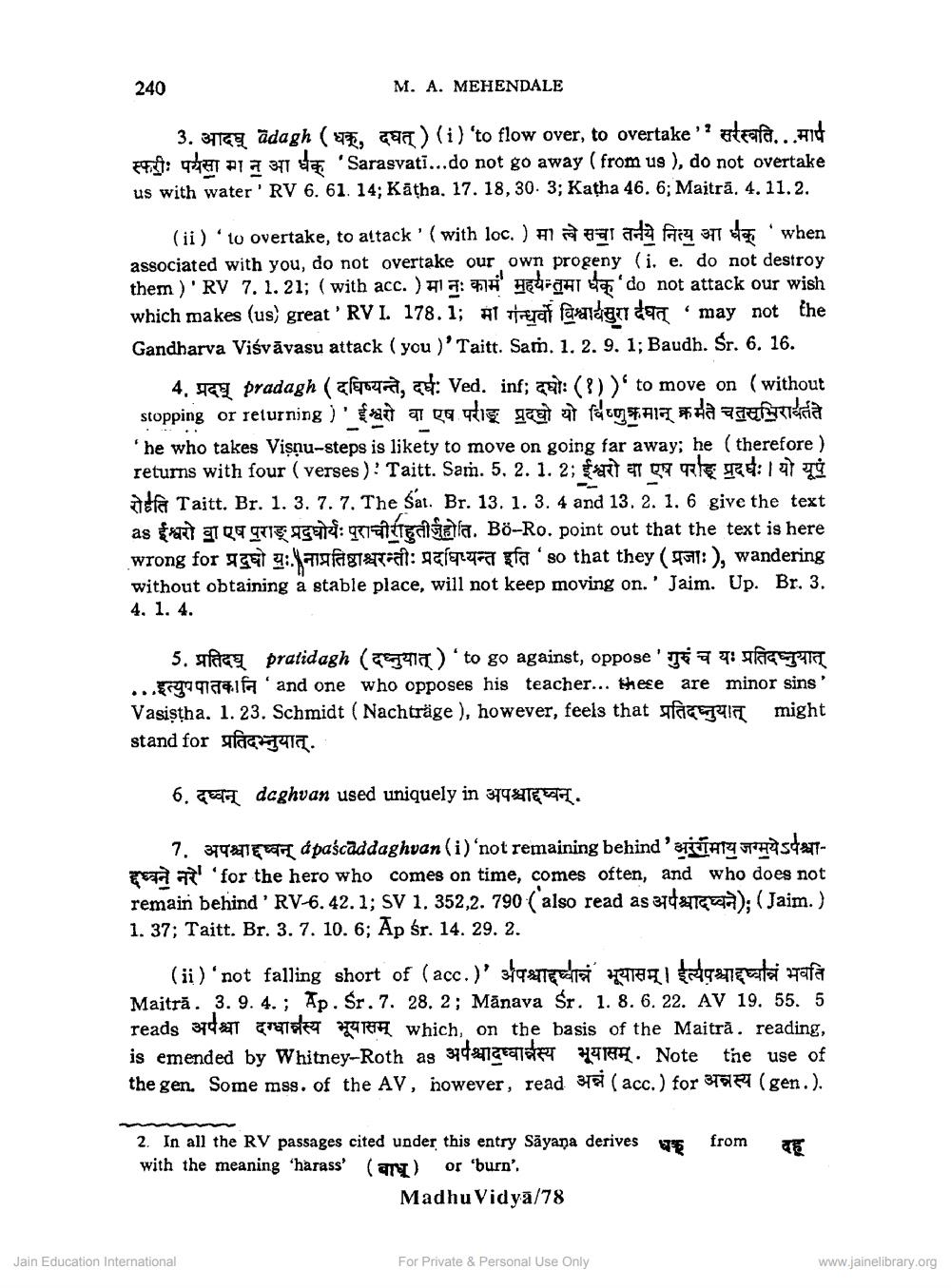________________
240
M. A. MEHENDALE
3. B y adagh (9, (i) 'to flow over, to overtake!? utrafa. 9: TR1 a 37 'Sarasvati...do not go away (from us ), do not overtake us with water 'RV 6. 61. 14; Kätha. 17. 18, 30. 3; Katha 46. 6; Maiträ. 4.11.2.
(ii) to overtake, to attack' (with loc. ) h a rda farz TT when associated with you, do not overtake our own progeny (i. e. do not destroy them)' RV 7. 1. 21; (with acc. ) 19: H kurqat b'do not attack our wish which makes (us) great 'RVI. 178.1; 1 terat fe
may not the Gandharva Viśvāvasu attack (you )'Taitt. Sam. 1. 2. 9. 1; Baudh. Śr. 6. 16.
4. all pradagh ( alarcunt, at: Ved. inf; ma: (?))' to move on (without stopping or returning )' fn9 ar ga is geen a faqAIT #Ha gaudia ' he who takes Visņu-steps is likety to move on going far away; he (therefore ) returns with four (verses). Taitt. Sam. 5. 2. 1. 2; Sarita Q9 ER:191 g atte Taitt. Br. 1. 3. 7. 7. The sat. Br. 13. 1. 3. 4 and 13. 2. 1. 6 give the text as ईश्वरो वा एष पुराङ् प्रदुघोर्यः पुराचीराहुतीर्जुहोति. Bo-Ro. point out that the text is here wrong for agat gratiafastarat: 917477 fa' so that they ( 4511: ), wandering without obtaining a stable place, will not keep moving on.' Jaim. Up. Br. 3. 4. 1. 4.
5. प्रतिदघू pratidagh (दध्नुयात् ) to go against, oppose ' गुरुं च यः प्रतिदध्नुयात् ...gagafa' and one who opposes his teacher... these are minor sins' Vasistha. 1. 23. Schmidt (Nachträge ), however, feels that afacerea might stand for fact1417.
6. E
daghvan used uniquely in 379 TEL
7. 3792 dpascaddaghvan (i)‘not remaining behind 'STATE THIS4837
''for the hero who comes on time, comes often, and who does not remain behind 'RV-6.42.1; SV 1, 352,2. 790 ( also read as 374876a); (Jaim.) 1. 37; Taitt. Br. 3. 7. 10. 6; Ap śr. 14. 29. 2.
(ii) 'not falling short of (acc.)' staat er zeri generala wafa Maitră. 3. 9. 4.; Ap. Śr. 7. 28. 2; Mänava Śr. 1. 8. 6. 22. AV 19. 55. 5 reads 370 JT Cat 7 which, on the basis of the Maitră. reading, is emended by Whitney-Roth as 32778ealt . Note the use of the gen. Some mss. of the AV, however, read 38 (acc.) for 875161 (gen.).
from
2. In all the RV passages cited under this entry Sāyana derives with the meaning 'harass' (an) or 'burn'.
Madhu Vidyā/78
Jain Education International
For Private & Personal Use Only
www.jainelibrary.org




